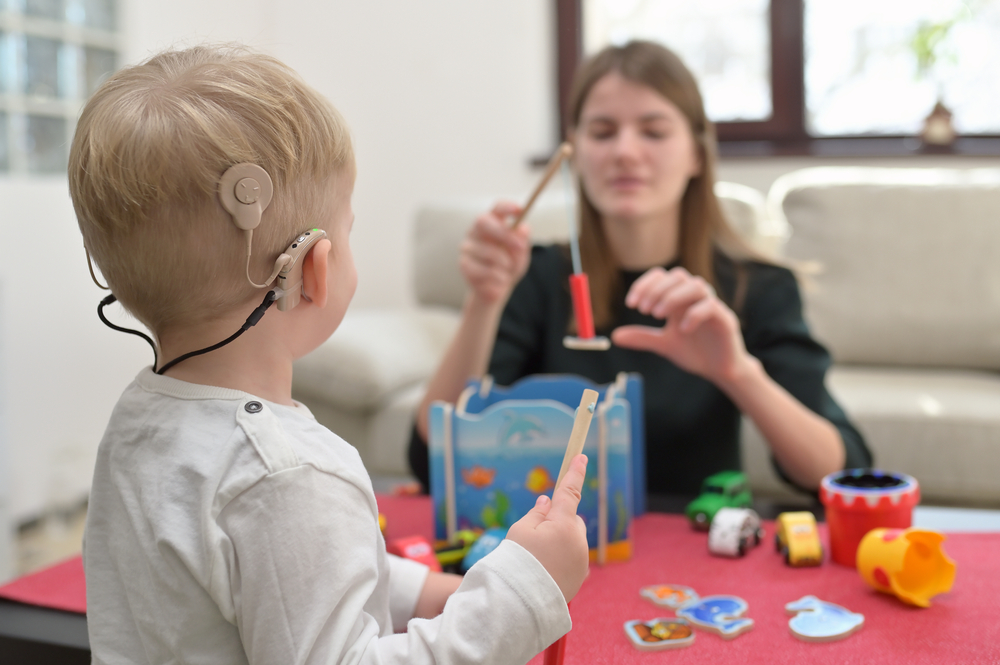What is it?
Pediatric hearing loss is a loss of hearing that occurs either prior to birth (congenital) or develops later (acquired). Hearing loss can result from genetics, exposure to certain drugs (ototoxic), exposure to an illness such as rubella or herpes, or exposure to loud noises after birth. Hearing loss is common in babies who spend extended time in the NICU due to the machine noises’ impact on underdeveloped ears.
Did you know there are two types of hearing loss?
Sensorineural- hearing loss resulting from damage to the inner ear, including the cochlea and auditory nerves. This hearing loss is typically permanent.
Conductive– hearing loss resulting from blockage or damage to the outer ear. Conductive hearing loss is typically caused by a build-up of wax, fluid behind the eardrum, a foreign material being lodged in the ear, or a punctured eardrum. Conductive losses can oftentimes be treated with medication and/or surgery.
What are the signs and symptoms?
- Frequent ear infections
- Preterm birth
- Not startling to loud noises
- Not responding when called by name
- Responding when you are in the child’s sight, but not when you are out of sight
- Responding well to gestures, but not when spoken to
- Staring at your mouth, hands, or bright colors
- Speaking/body sounds (e.g. farts, burps) are unusually loud
- Use of unclear speech sounds
- Delays in babbling, first-word development, or speech sound development
- Only appearing to hear certain noises (e.g. high or low pitch)
- Not following directions consistently
- Often asking “huh” or “what” when you speak to them
- Turning up TV/music unusually high
How does hearing loss affect speech and language development?
Lack of access to sound early in life can lead to delays in both expressive communication, or how the child communicates with you, and receptive language, or how the child understands you. If a child does not have access to all of the sounds needed to interpret speech, they often fall behind in meeting early prelinguistic and linguistic skills. The longer a hearing loss is not identified, the more behind a child will get. Early treatment of hearing loss is highly correlated with better language and academic skills.
Hearing loss also can impact a child’s articulation, or their pronunciation of speech sounds, as they do not have access to all of the frequencies needed to properly imitate certain speech sounds. The speech sounds that are most often affected are high pitch, such as /s, z, th, sh/, and less visible sounds, such as /r, m, n, k, g/.
What should I do if I’m concerned?
If you believe your child may have hearing loss, contact your pediatrician for a hearing screening. If further concerns remain, ask for a referral to an audiologist and ear nose and throat physician (ENT). These specialists will perform tests to assess hearing fully and counsel you on the next steps.
My kid has been diagnosed with hearing loss, what are my next steps?
- Follow the guidance of your audiologist or ENT regarding options for amplification (such as hearing aids and cochlear implants).
- Schedule an evaluation with a speech therapist specializing in hearing loss, such as Discover Speech Therapy, to support your child’s speech and language development.
- Consider your options for at-home language enrichment. If your child does not have full access to sound, using ASL signs and other spoken language strategies can enhance your child’s development.
- Contact Deaf clubs/schools for support and resources for children with hearing loss. Knoxville’s Center for the Deaf and the Tennessee School for the Deaf are great resources!
- If your child is under 3, your child may qualify for early intervention services with TEIS. Contact them for an evaluation. For more information, visit this website.
Sources:
